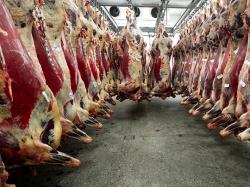Canada & The United States Sign Agreement On Animal Disease Zoning
January 17, 2013 | 2 min to read

WINNIPEG, MANITOBA – Agriculture Minister Gerry Ritz announced today that Canada and the United States intend to recognize each other''s zoning measures during highly contagious foreign animal disease outbreaks.
Although foreign animal disease outbreaks are very rare in North America, this arrangement will help to minimize trade disruptions while still preventing the spread of disease, should an outbreak occur.
"Cross-border trade in live animals, meat and other animal products and by-products contributes billions of dollars each year to Canada''s economy," said Minister Ritz. "This arrangement will keep U.S. market opportunities open for Canadian producers should a foreign animal disease outbreak occur, all while protecting human and animal health."
This initiative fulfills a commitment made in the December 2011 Joint Action Plan of the Canada-United States Regulatory Cooperation Council (RCC), which is aimed at better aligning the two countries'' regulations. The main goal of the RCC is to enhance the economic competitiveness and well-being of the Canada and the U.S., while maintaining high standards of animal health, public health and safety and environmental protection.
Under the arrangement, each country intends to accept each other''s decisions on establishing, maintaining and releasing a disease control and eradication zone if an outbreak of a foreign animal disease, such as foot-and-mouth disease or classical swine fever, occurs.
A detailed guidance framework, outlining exactly how the arrangement will work, is under development. The framework will lay out agreed-upon processes and conditions for zoning recognition, and will involve extensive consultation with industry groups, states and provinces.
In practice, the arrangement will mean that if Canada were to establish a disease control and eradication zone anywhere in Canada, the United States Department of Agriculture would continue to allow imports of live animals, animal products and by-products from disease-free areas of Canada. Once Canada released the zone, the U.S. would allow trade to resume from that area. Reciprocal arrangements would apply in the case of zones established anywhere in the United States.
For more information on the Canada-United States Regulatory Cooperation Council (RCC), visit http://actionplan.gc.ca/RCC.
Source: Canadian Food Inspection Agency
